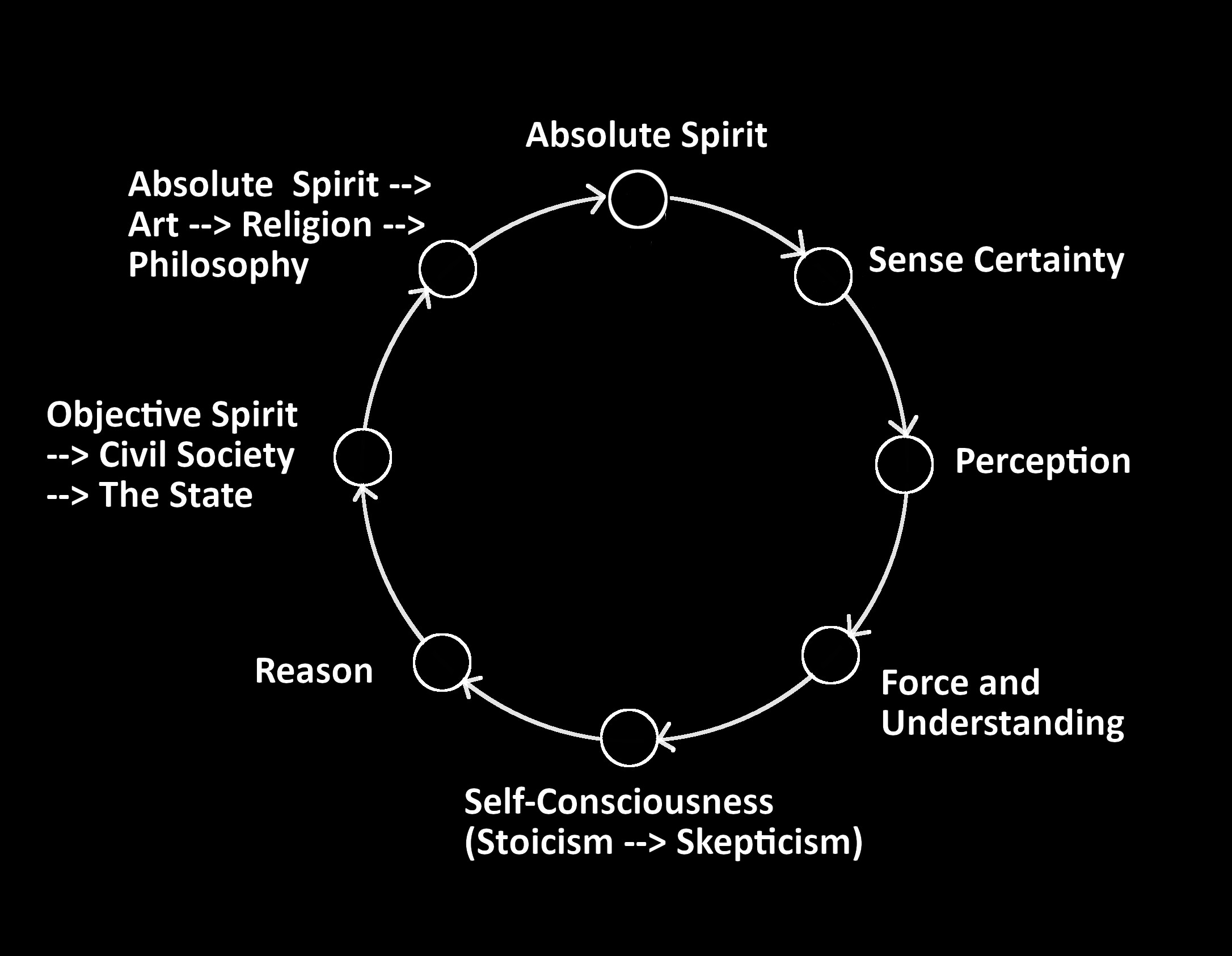
Home (Panoply)
Contact
How to play the game
How to Join the League
Books

Think of the presentation of sound and light that constitutes your experience of the world: the phenomena of which you are aware; this all constitutes your awareness of mind, or Spirit.
Spirit, throughout history and via the minds of human beings, individually and collectively, struggles inexorably to know itself. a process that gives rise to human history. (Individual minds are "moments" of Spirit; that is, they instantiate the universal, Spirit, but also participate in its coming to know itself).
The process begins with:
Spirit.
Sense Certainty.
Contradiction:
The object of which I am aware is here, now. But there was a now before; now is a universal. Therefore, this nowness, and the other universal properties of the object, must have been attached to the object (Ding-an-sich) by the mind itself (Cf. Kant).
Perception.
Contradiction: But universals cannot be attached to a stable substrate.
Force and Understanding.
Contradiction:
The force is supposed to exist in the world apart from mind, from Spirit. But force is not immediately observable, so it's no less subjective than the properties.
Self-Consciousness.
Contradiction:
I thought I was autonomous, but now I encounter another consciousness that also sees itself as the source of truth. Is the other just an object to me? Or is the other a subject like me, with its own autonomy and self-certainty?
Resolution:
To have self-certainty, I have to be recognized by the other who is not reducible to myself, by another self-consciousness. So, in a fight-to-the-death, I and the other should risk our lives to negate one another. Each must prove that he is autonomous.
Contradiction:
But if the other dies, then I will not get the recognition that I crave.
Resolution:
So one of us will submit to the other. This introduces the Master-Slave Dialectic.
As a master, I will have autonomy; as a slave, I will not.
Contradiction:
But now I realize that as a master, I will actually lack autonomy, lack freedom, because I am dependent on the slave. And if I am a slave, I am actually interfacing with the world, overcoming fear, learning skills, etc.—I am coming to possess an inner autonomy.
Stoicism:
Resolution/Belief:
Dominating others does not bring autonomy. Rather, autonomy comes form doing what the slave is doing: internalizing struggle and changing the world. Autonomy comes from developing the capacity to endure, to reflect and to transform the world.
I might be a slave in body, but I am a master in Reason. I am free in my thoughts. I am free to reason.
Contradiction:
This freedom doesn’t engage with the world.
Resolution:
I will freely negate every truth claim. In so doing, I will be engaging with reality.
Skepticism:
Belief:
I will freely negate every truth claim. In so doing, I will be engaging with reality.
Contradiction:
This is isolating. Spirit becomes an Unhappy Consciousness. Spirit has become split against itself: the finite, the sinful, the suffering is spilt against the infinite, the perfect. Spirit yearns for unity but unity seems unattainable. There is emptiness and anguish.
Reason.
Contradiction:
Individual Reason, trying to be the source of all meaning on its own, finds itself in conflict, alienation, moral fragmentation.
Objective Spirit.
Contradiction:
The family is a natural order, not yet fully rational. And when the child grows up, he becomes independent.
Civil Society
Resolution/Belief:
I must externalize my ethical life; I must move into the public sphere, into the world of economics, rights, work, law, property, markets and institutions.
Contradiction:
Civil society is driven by private concerns; it involves competition and brings alienation.
The State
Resolution/Belief:
I will seek a higher form of unity. I will participate in a state, not in a tyrannical state, but one which is an ethical organism: because "the march of God is the state." The state is the complete ethical life of a people. In the state, individuals participate in mutual freedom via shared law and customs.
Note: That Hegel sees the State as a great collective person can be inferred from the ways he refers to it: he calls the State an "ethical organism; " he calls it "the Ethical Spirit" (der sittliche Geist), "Objective Spirit" (objective Geist) in its highest development; "the Universal Will" (der allgemeine Wille); "the Objective Spirit as ethical subject" (der objective Geist als sittliche Subject); and "the actuality of the ethical idea" (die Wirklichkeit der sittlichen Idee).
Contradiction:
Even in a rational state, there can be conflict between law and an individual's conscience. Spirit experiences alienation and moral anxiety. Unity disappears.
Absolute Spirit.
Contradiction:
Art is too external, too finite, to be able to express Spirit's depth.
Religion
Resoution/Belief:
I will find unity in religion. In religion, I am aware of the Absolute by means of imagination, symbols and story. In Christianity, God becomes man, who dies and is resurrected. The finite unifies with the infinite in the Holy Spirit.
Contradiction:
Religion only pictures the Absolute—it does not conceptualize it; it doesn't think it.
Philosophy
Resolution/Belief;
I will turn to philosophy. Philosophy is the highest form of Absolute Spirit. In philosophy, I, Spirit, know myself conceptually. The infinite and the finite, the individuals and the universals, are no longer oppositions; they are only moments in the whole of Spirit. This is Absolute Knowing (absolutes Wissen); I, Spirit, now know that all difference was of my own making and that truth is the whole, is the Absolute. My journey is completed—Spirit now knows itself.